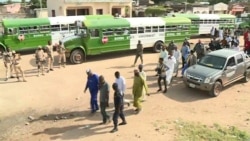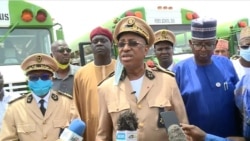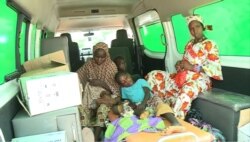More than 850 former Boko Haram fighters and their family members who escaped from the jihadist group to Cameroon have left northern Cameroon for Nigeria. Nigerian authorities say they are taking the former militants to Nigerian disarmament centers after complaints that such centers in Cameroon were overwhelmed by the number of former jihadists defecting since the terrorist group’s leader was declared killed in May.
Hundreds of people Saturday gathered along streets, watching and waving as 20 buses transporting former Boko Haram militants and their families left Mora, a town on Cameroon’s northern border with Nigeria, for Banki, a town in Nigeria’s Borno state.
The governor of Cameroon’s Far North region, Midjiyawa Bakari, said the former militants agreed to voluntarily return to Nigeria.
Bakari said the ex-Boko Haram militants who have agreed to return to Nigeria’s Borno state are Nigerian citizens, 854 of them which also include their families. He said they told Cameroonian government officials that they were either fighters or slaves on plantations controlled by the jihadist group. Bakari said the Nigerian ex-fighters promised to be good citizens of Borno state.
Bakari said about 150 more former militants who are of Nigerian nationality will return to their country in the weeks ahead, but he did not explain why they are not returning now.
A majority of the ex-militants are women and children. Cameroon said more about 320 males [including young boys among them] are former fighters of the jihadist group. 80 are females the terrorist group used as spies in localities they attacked, authorities said. 454 others are their family members.
34-year-old Kadir Hassan said he is spokesperson of the former Boko Haram militants who agreed to return to Nigeria. He escaped from the Sambisa Forest, a Boko Haram stronghold on the Cameroon-Nigeria border in August. The former fighter said he is looking forward to meeting his relatives in Kukawa, a town in Nigeria’s Borno state.
Hassan said he left Kukawa to join the jihadist group in March 2020.
Hassan said many Cameroonians and Nigerians he saw in the Sambisa Forest want to leave Boko Haram but are afraid that fighters will kill them. He said he is pleading with the Multinational Joint Task Force of the Lake Chad Basin that is fighting the jihadist group to help people who are still under Boko Haram captivity and want to leave. He said the ex-combatants pledge to contribute to the development of their communities when they return to Nigeria.
The task force made up of troops from Niger, Cameroon, Chad and Nigeria said it took the surrendered Boko Haram militants to demobilization centers called DDRs in Meri and Meme, Cameroonian towns on the border with Nigeria.
In August, Cameroon said it was negotiating to return the ex-militants to Nigeria as the DDR centers were becoming overcrowded.
Lawan Aba Wakilbe, Nigeria’s Borno state Commissioner for Education, represented the government of Nigeria at the ceremony to hand over the former militants. He said the former militants will be kept at rehabilitation centers in Banki, Nigeria.
“We are going to rehabilitate them, and we will reintegrate them into society. You see taking this number away from Boko Haram has given them a shortage in manpower. We are happy and we would like to use this opportunity to thank the Cameroonian government for keeping and handing them over to us,” he said.
Cameroon says former militants still at the demobilization centers on its northern border with Nigeria and Chad include Chadians, Cameroonians and Nigerians.
Bakari said DDR centers in Cameroon’s northern border will continue to receive militants and fighters who surrender and drop their weapons.







